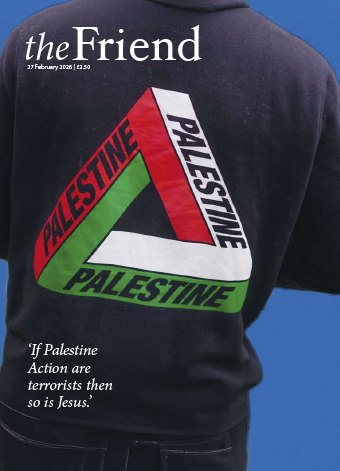
The Friend is a weekly magazine in which Friends speak to each other and to the wider world, offering their insight, ideas, news, nurture and inspiration.
Nurturing Quaker community, each issue offers a space for Friends to share their concerns, and to support each other in faith and witness.
The Friend: enriching, inspiring and connecting the Quaker community since 1843.
Hello Friends. In the 2024 Quaker Week issue we wrote to you about the Friend’s financial circumstances – and our action plan to put us on a solid footing. Eighteen months on, I’m happy to report some progress. We still have some way to go, and continue to need your support, but we have been very grateful for your generosity this far – our accounts up to 30 June 2025 would have shown a deficit had we not received your contributions, including a generous legacy from a longstanding subscriber.
In 2017, just like Palestine Action activists have done more recently, we broke into an airbase to try to stop war crimes. Thankfully, Woody and I were two nice white boys.
The American Friends Service Committee (AFSC) and Quaker Peace & Social Witness (QPSW) have nominated Concordis International for the 2026 Nobel Peace Prize. Concordis is an international non-governmental organisation (INGO) based in the UK, operating in the Central African Region: Cameroon, Chad, Central African Republic, Sudan, Abyei and South Sudan. It has worked for two decades in fragile conflict zones, supporting communities in finding workable solutions that address the root causes of conflict and contribute to lasting peace and economic development.
Our first Meeting of Quakers in Scotland (QiS) began in worship. Friends might say, ‘Of course it did!’, but our clerk made sure nothing was assumed, and the process of a Meeting for Business for Worship was fully explained. It was a wise decision, because it transpired that among the 100-plus Friends online, from across twenty-three Local Meetings and worshipping groups, were Friends who had never previously attended Area (AM) or General Meeting for Scotland before.
‘The heart of Quaker ethics is summed up in the word “simplicity”’ (Quaker faith & practice 20.27). But we live in an increasingly complex world.
Controversy has erupted recently over public figures describing Britain as being ‘colonised’ by immigrants. This has reopened essential questions about how we speak of migration, belonging, and our shared history. For Friends committed to seeing that of God in everyone, this moment calls us to deeper reflection and radical honesty.

Become a subscriber to enjoy unlimited access to our articles, dating back to 2009! Online subscribers get the Friend to their inbox each week, can comment on articles, and dive into our 1914-18 digital archive too!
Whether you are new to Quakerism or have been going to Meeting for years, you’ll find something here to inspire, inform and challenge you.
News | Views | Reviews
Written by and for Friends on the bench
Subscribe